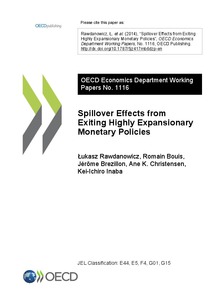Spillover effects from exiting highly expansionary monetary policies
"The prospective normalisation of monetary policies in the main OECD areas will be challenging given that current policy rates are likely to be significantly below neutral levels and that central bank balance sheets will be above the pre-crisis levels by a wide margin. Monetary policy normalisa...
| Main Authors: | , , |
|---|---|
| Institution: | ETUI-European Trade Union Institute |
| Format: | TEXT |
| Language: | English |
| Published: |
Paris
2014
OECD |
| Subjects: | |
| Online Access: | https://www.labourline.org/KENTIKA-19118847124919360299-Spillover-effects-from-exiting.htm |
| Summary: | "The prospective normalisation of monetary policies in the main OECD areas will be challenging given that current policy rates are likely to be significantly below neutral levels and that central bank balance sheets will be above the pre-crisis levels by a wide margin. Monetary policy normalisation is likely to start in the United States before other main OECD areas, with potential global spillovers, as was already experienced in mid-2013 when the mere discussion of tapering unsettled global financial markets. A gradual increase in interest rates, in the context of strong growth and rising equity values, would contribute to a balanced US recovery and have a benign impact on the rest of the world. However, a rapid rise in bond yields would risk generating instability in the US shadow banking sector, and the financial system more generally, even if banks seem increasingly resilient to such a shock. Although model simulations suggest that a large and protracted government bond yield shock would not have large trade spillovers in the absence of crisis events in the United States or abroad, an induced increase in bond yields in other countries, together with an induced large decline in equity prices, would have a sizeable effect on the OECD and largest emerging market economies. The latter countries are particularly vulnerable to such spillovers given their generally less liquid financial markets and, in some cases, weak fundamentals related to the banking system and external financing. In the United States, the authorities should aim at managing smoothly the exit and at strengthening the resilience of shadow banking institutions so that the risk of liquidity-induced fire sales is reduced. This should be accompanied in other countries by measures to increase the resilience to interest rate shocks, and when the shock occurs, allowing exchange rates to adjust flexibly and implementing offsetting fiscal measures if scope is available." |
|---|---|
| Physical Description: | 44 p. Digital |

